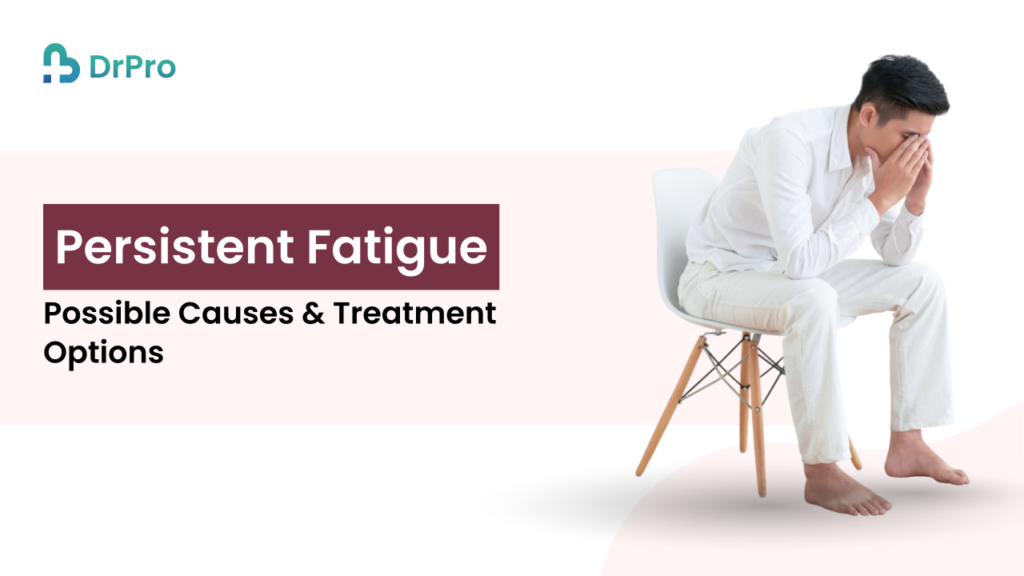Staying tired all the time could mean something else. Tiredness is more than just feeling sleepy; it is a condition that lasts for quite several months. The cause for the continuation of feeling fatigue includes medical and lifestyle factors. It is important to know what the probable causes and available solutions are for effective management and reducing fatigue.
Possible Causes of Persistent Fatigue
1. Lack of Sleep
- The constant feeling of tiredness due to a lack of good sleep could be attributed to stress.
- poor sleep hygiene practices.
- sleep disorders like insomnia and sleep apnea.
Solution: Try to maintain a consistent sleep schedule and avoid screen time at night.
2. Nutritional Deficiencies
Certain fatigue conditions result from nutritional deficiencies.
- Iron deficiency (anemia) – Reduces oxygen supply to the body, causing fatigue.
- Vitamin B12 deficiency – Affects nerve function and energy levels.
- Vitamin D deficiency – This leads to muscle weakness and tiredness.
Solution: A balanced diet rich in iron, vitamins, and minerals can help. If necessary, take supplements as prescribed by a doctor.
more updated for: Lung Cancer in Non-Smokers: Causes & Symptoms
3. Chronic Stress and Mental Health Issues
- Prolonged stress, anxiety, and depression can drain energy levels.
- Mental health conditions affect concentration and motivation, making daily tasks difficult.
- Emotional stress leads to disturbed sleep, further increasing fatigue.
Solution: Engage in stress-relieving activities like meditation, exercise, and deep breathing. Seek professional help if needed.
4. Medical Conditions
Many diseases can cause fatigue, including:
- Diabetes: Whether there is high or low blood sugar, it can drain energy.
- Thyroid disorders: While hypothyroidism lowers energy, hyperthyroidism may induce significantly reduced energy.
- Heart diseases: Reduced blood supply means lesser energy.
- autoimmune disorders: such as lupus or rheumatoid arthritis can also occur with inflammation leading to fatigue.
Solution: Regular health check-ups and proper treatment for medical conditions can reduce fatigue.
5. Chronic Fatigue Syndrome (CFS)
- A condition where extreme tiredness lasts for more than six months without a clear cause.
- Symptoms include muscle pain, difficulty concentrating, and unrefreshing sleep.
- The exact cause is unknown, but viral infections and immune system problems may contribute.
Solution: There is no specific cure, but lifestyle changes, medication, and therapy can help manage symptoms.
6. Dehydration
- Not drinking enough water can lead to low energy and headaches.
- Even mild dehydration can cause tiredness and dizziness.
Solution: Drink enough water throughout the day and limit caffeine and alcohol intake.
7. Poor Diet and Lifestyle
- Eating too much-processed food and sugar causes energy crashes.
- Skipping meals can lead to low blood sugar and tiredness.
- A sedentary lifestyle reduces oxygen circulation in the body.
Solution: Eat a balanced diet with whole foods, and engage in regular physical activity.
8. Medications
- Some medicines, such as antihistamines, blood pressure drugs, and antidepressants, can cause drowsiness.
- Overuse of painkillers and sleeping pills can also lead to fatigue.
Solution: If a medication is making you tired, talk to a doctor about possible changes.
Treatment Options for Persistent Fatigue
1. Improve Sleep Quality
- Go to sleep cycle and wake up at pretty much the same time every day.
- No screens before bed!
- Invest in good sleep.
2. Eat a Balanced Diet
- Include proteins, healthy fats, and complex carbohydrates in meals.
- Consume iron-rich foods like leafy greens, beans, and lean meats.
- Avoid excessive sugar and junk food to prevent energy crashes.
3. Manage Stress
- Do relaxation methods like meditation or deep breathing.
- Get into a hobby or activity that reduces stress.
4. Regular Exercise
- Even light exercise will help increase energy, such as just going for a walk.
- Don’t do vigorous exercises before going to bed.
5. Check for Medical Conditions
- Start with a big medical checkup and rule out any underlying health condition.
- Follow the prescribed treatment once the diagnosis is established for thyroid problems or anemia.
6. Adjust Medications if Needed
If it’s the medications making you fatigued, you should talk to a doctor about the possibility of switching things up.
7. Staying Hydrated
- Drink at least 6–8 glasses of water daily.
- Reduce intake of caffeinated and sugary drinks.
8. Seek Professional Help
- If the fatigue is because of an issue related to mental health, a therapist can help you.
- For treating stress-related fatigue, cognitive-behavioral therapy (CBT) is an effective way.
How to Prevent Persistent Fatigue
Prevention is more about healthy living, and here are some main habits that contribute to a life free from fatigue:
1. Get Enough Rest
- Get enough sleep, that is, 7 to 9 hours every night.
- Short naps (15 to 20 minutes) can refresh the energy levels during the day.
2. Follow a Healthy Routine
- Steady meal intake.
- Include fiber, protein, and other important nutrients in your meals.
3. Minimize Alcohol and Caffeine
- Alcohol harms sleep and a lot of caffeine leads to energy crashes.
- Good substitutes are herbal tea and fresh juice.
4. Stay Active
- Engage regularly in physical activity, such as jogging, cycling, or swimming.
- Do not sit long. Short walks here and there: one should be moving.
5. Stay Connected
- The company can raise good spirits while lowering stress-induced fatigue.
- When one gets into beloved activities, his energy and desire seem to refill.
Conclusion
Persistent fatigue is a very common issue that can interfere with daily human activities. It can arise from various causes like sleep deprivation, poor nutrition, stress, medical conditions, and unhealthy lifestyles. The first step to discovering the appropriate treatment lies in understanding the cause of ongoing fatigue. Better sleep, nutrition, active exercise, and proper stress management will enable one to have reduced fatigue levels. If symptoms persist, however, medical advice should be sought. Little steps into a healthier lifestyle can go a long way in changing how people feel and their general well-being.
With digital transformation in healthcare, technology is making it easier to track health, manage stress, and find the right care. Tools like drpro help individuals connect with doctors, access wellness resources, and take proactive steps toward better health.
Frequently Asked Questions
Q1. When should I see a doctor for persistent fatigue?
Consult a doctor when fatigue goes beyond a few weeks and begins to interfere with daily life.
Q2. Can dehydration cause tiredness?
Yes: tiredness, dizziness, and headaches can develop even with slight dehydration.
Q3. What are the foods that help to alleviate fatigue?
Iron-, protein-, and complex carbohydrate-rich foods-none less, like leafy greens, nuts, and lean meats-maintain energy levels.
Q4. Does exercise help against fatigue?
Exercise improves circulation and energy flow, reducing the level of fatigue.
Q5. Does stress lead to chronic tiredness?
As a chronic stress event, it may lead to exhaustion and loss of motivation, but managing stress through relaxation techniques can help.


